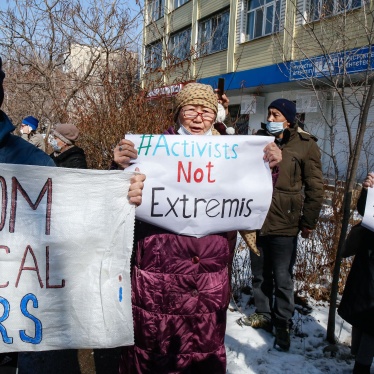A Council of Europe expert group has rightly decided not to develop guidelines for the acceptable use of diplomatic assurances to justify sending people to places where they are at risk of torture, Human Rights Watch said today.
“We welcome this decision,” said Holly Cartner, Europe and Central Asia director at Human Rights Watch. “It shows just how contentious diplomatic assurances are. Giving them the veneer of legality would have ignored mounting evidence that assurances do not protect returnees from torture.”
The experts met in Strasbourg, France, on March 29-31, to debate the problematic practice by governments of sending terrorism and national security suspects to countries where they are at risk of torture, based on assurances from receiving states that the suspects will not be abused upon return. Human Rights Watch and a number of other nongovernmental groups attended the meeting as observers.
Human Rights Watch, along with numerous partner organizations and international experts, has long opposed the development of guidelines for the use of diplomatic assurances, arguing that such standards would only legitimize the use of what has been proven an inherently flawed device. In a joint statement addressed to the experts convening in Strasbourg, Human Rights Watch and seven partner nongovernmental organizations called on governments to reject any proposals to establish minimum standards for the use of diplomatic assurances, and to reject the use of assurances altogether when suspects are returned and face the risk of torture.
“Our research clearly demonstrates that diplomatic assurances against risk of torture simply do not work,” said Cartner. “They are inherently unreliable. Creating standards for their use would simply give governments further incentive to use them, and ultimately expose more people to torture.”
Human Rights Watch said that establishing standards for the use of diplomatic assurances would also serve a severe blow to the international ban on torture, which is absolute. It prohibits transferring persons – no matter what their crimes or suspected activities – to places where they would be at risk of torture and ill-treatment (the nonrefoulement obligation). No exceptions are allowed, even in time of war or national emergency.
Ahead of this week’s meeting, the Council of Europe expert group circulated a questionnaire to the council’s member and observer countries, requesting information about their practice in using diplomatic assurances. Human Rights Watch’s analysis of the state replies, including those by Austria, Germany, Lithuania, The Netherlands, Italy, Sweden, and the United Kingdom, illustrates clearly the ways in which diplomatic assurances fail to serve as a safeguard and expose returnees to grave risk of torture.
A case in point is Sweden’s forced return of Ahmed Agiza, an asylum seeker from Egypt, in December 2001 based on diplomatic assurances from the Egyptian government that he would not be ill-treated and would be granted a fair trial upon return. Egyptian authorities violated both promises, as evidenced by the U.N. Committee against Torture decision in May 2005, which found Sweden in violation of the anti-torture convention for transferring Agiza. The Swedish government, however, has proven unable to secure compliance with these breached promises and has taken no meaningful steps to compensate Agiza for the suffering he sustained. Agiza remains in prison to date, with no remedy and at grave risk of continued abuse at the hands of Egyptian authorities.
The U.K. government’s claims that diplomatic assurances, which it calls “Memoranda of Understanding” (MoUs), can be made to work through the establishment of an effective post-return monitoring mechanism is another illustration of the problems inherent in such assurances. Such arguments ignore the very serious obstacles to the monitoring of torture, especially the very limited value of occasional visits to an isolated detainee who has every reason to fear reprisals if reporting mistreatment. Added to this fundamental difficulty is the question of who would be doing the monitoring – especially in countries with no independent civil society. In Libya, for example, the U.K. has approached a foundation run by the son of the Libyan leader Muammar al-Qadhafi to undertake the monitoring.
The Lithuanian government’s reply makes the additional observation that European governments’ use of diplomatic assurances would provide an opportunity for other governments to exploit the same loophole in order to justify transfers of asylum seekers and terrorism suspects to countries where they are at risk of torture. It gave as an example the Kyrgyz government’s June 2005 forced return of Uzbek asylum seekers to near-certain torture in Uzbekistan, which was based on diplomatic assurances from the Uzbek government.
“The information submitted by governments themselves shows that diplomatic assurances serve not to satisfy their legal obligations, but rather as a tool to circumvent them,” said Cartner. “But today’s decision goes only half-way. Now the Council of Europe must altogether reject the use diplomatic assurances in returns to torture.”
The group of experts will be submitting its decision to the Council’s Steering Committee for Human Rights, a body composed of all member and observer states. It commissioned the experts’ work on diplomatic assurances, and is likely to consider their decision during its next meeting, which starts tomorrow.
Among those most vocal in opposing diplomatic assurances in returns to risk of torture is Louise Arbour, U.N. High Commissioner for Human Rights. On the issue of perfecting diplomatic assurances through the development of minimum standards, she has said that, “Although efforts could be made to improve on the practice of seeking these assurances, in my view it is fundamentally flawed in several ways.”
In addition to Human Rights Watch, the groups signing onto the joint statement submitted to the experts were Amnesty International, Association for the Prevention of Torture, International Commission of Jurists, International Federation for Human Rights, International Helsinki Federation for Human Rights, Redress, and World Organisation Against Torture.






